Background
The Department of Agriculture- Special Area for Agricultural Development (DA- SAAD) Program’s FY 2019 Vegetable Production Project enhanced farmers’ income in Northern Samar. Vegetable production project is a dynamic scheme of DA-SAAD in response to the market demand for vegetables in the province where generally the produce sold in the local market comes from Luzon.
Vicente Luna, or Tatay Vicente as he is fondly called is a 63-year-old farmer from Brgy. Cababtoan, Pambujan, Northern Samar. Tatay Vicente has long been a rice farmer who also grows vegetables which are the main ingredients of pakbet dish, in addition to other crops in his farm. Being a seasoned farmer led him to be an entrepreneur who sells his produce from farm to market.

He was identified and endorsed by the Municipal Agriculture’s Office to be a recipient of a SAAD project. On June 2019, Tatay Vicente together with 39 other individual beneficiaries in the province each received a livelihood assistance package that includes five types of vegetables seeds, fertilizers and training on vegetable production worth Php 7,049.80 with a total allocation of Php 281,992 in the municipality of Pambujan, Northern Samar.
Table 1. FY 2019 SAAD Vegetable Production Project inputs received by Vicente Luna
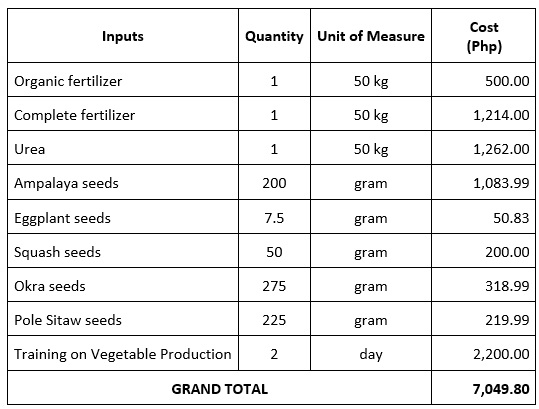
Aside from the interventions, the beneficiaries acquired skills and knowledge through specialized training on land preparation, planting, harvesting, packaging, and marketing facilitated by SAAD Region 8 in 2021.
Tatay Vicente’s vegetable production
Tatay Vicente’s routine starts early at dawn with a cup of coffee and a root crop. As the sun rises, he and his helper till the soil, weed, pulverize the plots, water the plants, harvest the vegetables, and pack the produce, ready for wholesale trade by noon and retail in the afternoon. His day usually ends at sunset where he rests after a whole day’s work.
Tatay Vicente and his wife raised eight children through his hard work in farming. Three of his kids are already professionals – a civil engineer, a licensed teacher, and a policeman. His second youngest is still pursuing a degree in civil engineering, while his youngest is currently in grade 12, and their eldest son assists in their farming activities. On the other hand, their twins died at an early age.

When asked about his income, he candidly said he can do mental math to account for his sales from his products.
“Sa tiempo san pandemic, naka-baligya ak sin maabot 11,709 kilos nga mga utanon nga umabot sin 1,700 ka kilo nga karabasa, 5,350 ka kilo ng rudyas, 3,614 ka kilo nga taron, 1,045 ka kilo nga okra, an akon la ugaring ampalaya kay gin atake san peste san bag o pala nga natubo,” he shared.
(From January to July 2020 during the pandemic, I sold 11,709 kilograms [kg] of pakbet vegetables, 1,700kg squash, 5,350kg string beans, 1,045kg okra, and 3,614kg eggplant. But the ampalaya plant was infected with pests during the early vegetative stage).
Though Tatay Vicente received the intervention during the last half of 2019, his production of pinakbet vegetables only started in January 2020 due to time constraints.
Table 2. Production of pinakbet vegetables
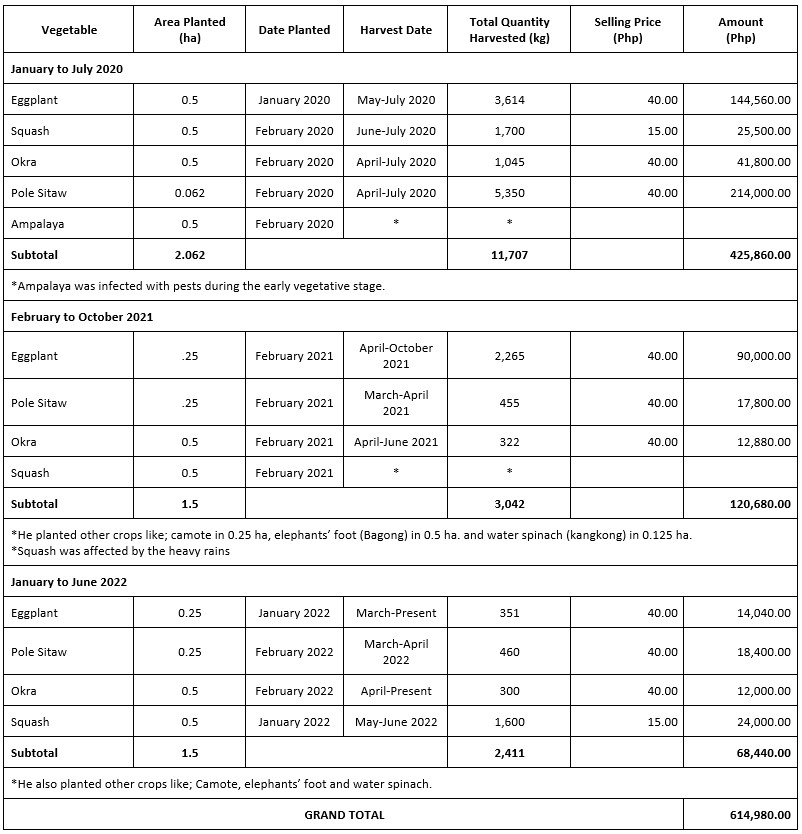
Tatay Vicente’s yearly routine includes planting vegetables from January to August, and rice from September to December. He shared that he considers farming as a far better livelihood, “Mas maupay gud an pag-uma kay kun mayaon ka na ani, pakabaligya mo kwarta dayon” (Once a farmer has a harvest, money comes in right away), he shared.
He is grateful to the DA-SAAD Program for the skills training he attended before the inputs were distributed, which enhanced his farming skills and abilities especially on farm management, problem-solving and interpersonal skills. He is also thankful for the quality seeds and fertilizers provided by the program.
On a conversation with Tatay Vicente about his farm produce and sales, he shared, “An bulig sa ako san SAAD nga programa, sugad san abono, liso, ngan training kaparte san pagtanom san utanon, dako an pakabulig san ak pag-uma, ngan naka pauswag diri la saak pakabuhian, naka undong pa ini san ak pagkatawo kay natutugunan an panginahanglan san ak pamilya.”
(The support that the SAAD Program provided to me, such as fertilizers, seeds, and training were substantial factors that contributed to my success as a farmer, but more importantly, it restored my self–dignity and sustains the needs of my family).
To date, Tatay Vicente continues to engage in sequential cropping of vegetables and rice on his almost two–hectare farmland and currently raises 48 native chickens at his backyard and promised to stick to working close to nature. ###
Writer: Farrah F. Ronato, DA-SAAD Northern Samar Area Coordinator

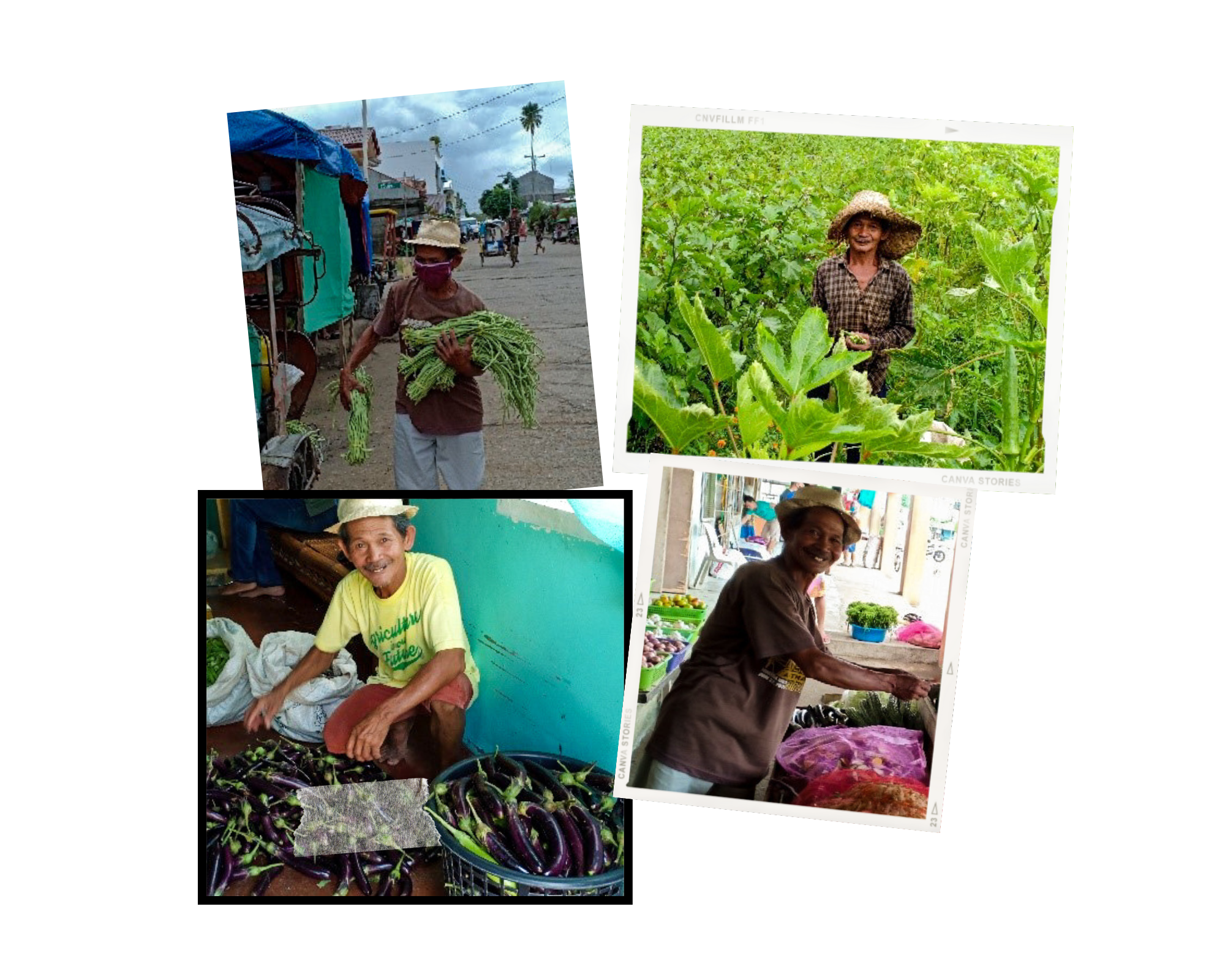
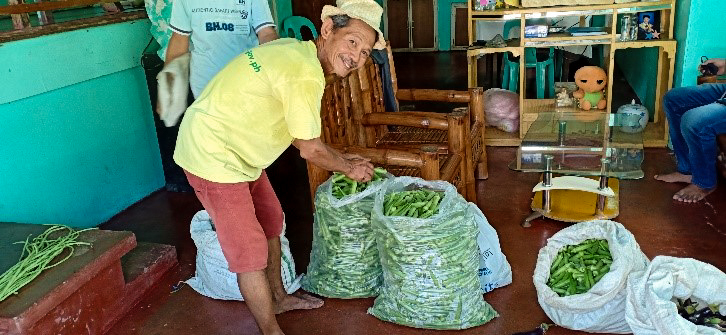
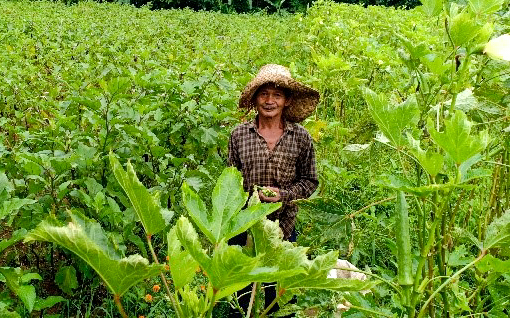
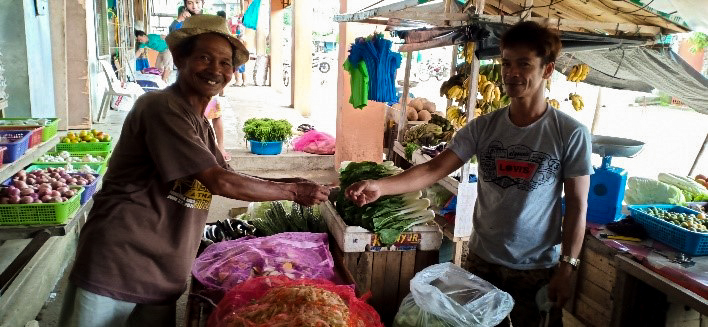
Comments (0)